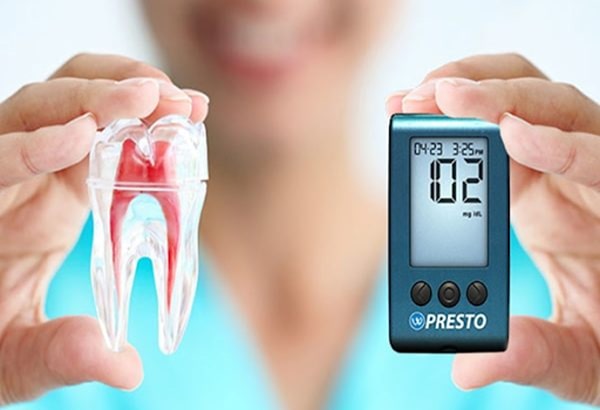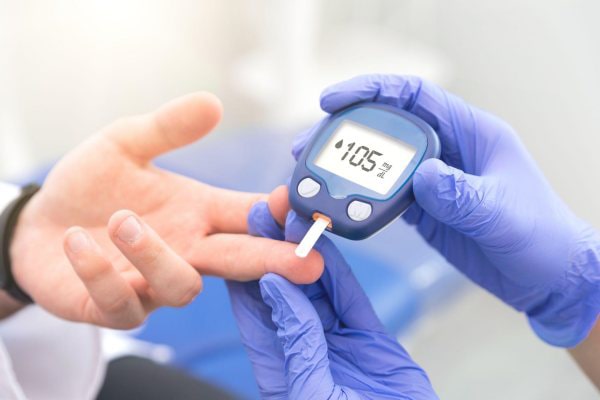Can diabetics get Dental Implants?
Can diabetics get implants or do they have to be cured to be treated? Dentists confirm that if you are in good health, have a stable blood sugar index, and have no dental disease, 90% can carry out implant placement.
Contents
Can Diabetics Have Implants?
According to doctors, people with diabetes can get Dental Implants if they meet all of the following requirements: general dental examination, blood sugar in the range of 7-10 mmol/l, X-ray/CT Cone Beam taken thoroughly to assess bone density and the condition of the teeth to be implanted.

What is the implant technique?
Implant is the process of implanting a metal post or metal frame into the jawbone below the gum to replace the lost tooth root. After a period of time, this post will integrate with the bone, replacing the root bone of the tooth. Finally,the porcelain crown is put on top to complete the Implant.
Dental Implants include minor surgical procedures such as: gingival incision, bone drilling, bone grafting, post implantation… Therefore, it will create open wounds, bleeding, pain, and sensitivity during treatment.
Indications for implant placement:
- Loss of teeth
- Loss of all teeth in the upper or lower jaw
- Just lost teeth, lost teeth for a long time
- Tooth decay, damaged pulp, loose teeth, broken roots
In case of contraindications:
- Lack of height and width of the jawbone
- Lack of bone mass in the roots of teeth
- The intermaxillary space is not enough space to restore new teeth
- Persons under 18 years old
- Persons who are suffering from acute infection of the oral cavity
- Pregnant women
- Persons with diabetes.
Thus, diabetes is a disease contraindicated to Dental Implants treatment. As this is a form of surgical treatment that creates a wound, in order for the wound to heal quickly, the most important thing is that the amount of blood circulating in the body must be stable. Meanwhile, people with diabetes often have blood sugar disorders.
So if you have diabetes and still want to have an implant, what criteria must you meet?
When can diabetics have Implant?
Criteria for implant placement for people with diabetes:
- Blood sugar is in the range of 7 mmol/l – 10 mmol/l. Specifically: fasting 90-130 mg/dl; less than 180 mg/dl after eating 2 hours; before going to bed at night 110 mg/dl.
- Other blood biochemical indicators are in the safe range.
- Stable health, no background diseases related to heart disease, blood pressure,…
- No disease in the oral cavity
- Have had a general dental check-up with an ultrasound machine. The doctor assessed that the jaw bone density was stable, the tissues in the place to be transplanted were clean, there were no signs of abnormal damage.
In conclusion, if the diabetes is well controlled and the indicators are stable, the chances of being prescribed Dental Implant by the dentist is over 90%. At this point, the transplant procedure is carried out as for a normal person.

Reasons why people with diabetes are not indicated for implant placement
- Poor blood circulation, abnormal blood volume: After gingival incision, it is easy to bleed a lot, which is difficult for blood to clot. The wound mouth takes a long time to dry, causing an infection of the oral cavity.
- Dry mouth periodontitis leads to weak teeth, digestive diseases: This can be difficult for surgical intervention as posts are likely to be rejected.
- Weak, sensitive body: Easy to experience allergies, side effects with anesthetics, pain relievers
- Must follow a special diet: Can not tolerate many foods at the same time, affecting the recovery of health after transplant.
Do diabetics have Dental Implant complications?
Diabetics are on the restricted list for Dental Implants. However, there are still some people with stable indicators who are eligible for treatment. Unfortunately, complications can still occur during and after the procedure.
Common complications when diabetics have dental implants:
- Prolonged bleeding gums, causing pain, bad breath
- Dull, sharp pain, sore at the incision site of the gums and alveolar bone
- Difficulty in stopping bleeding, long-healing wounds lead to infection of the implant area
- Injury to adjacent tissues such as adjacent teeth, jawbone, gums, nerves, pulp
- Numbness of jaw muscles or part of jaw due to nerve contact
- The implant post is loose, broken, and completely deviated from the neighboring teeth
- Expulsion of cylinders due to inability to integrate with the jawbone.
However, patients do not need to worry too much about these risks. If you are directly treated at a reputable dentist, the process will be safe, fast and guaranteed to be painless.
A team of highly skilled and experienced doctors will know how to make a gingival incision with minimal damage, gently align the Abutment and predict the time of bone integration, and especially, use new Dental Implant technology to help stop bleeding and relieve pain quickly.
So do diabetics have painful Dental Implants? The doctor said it was painless. Before the patient goes to the operating table, anesthesia will be injected. Therefore, the process of implanting the post is completely free of pain, fear, and insecurity.
Notes when implanting teeth
Diabetics when undergoing Dental Implant procedure should note the following shares:
Choose a gold deposit at a reputable dental facility
As the doctor shared above, the dental facility is a place that greatly determines the success rate of the Dental Implant process for diabetics.
Please select the places that meet the following 5 criteria:
- Facilities including function rooms, specialized machines… meet the standards of the Ministry of Health.
- Process of consultation, examination, and treatment is flexible and professional.
- Information about services, prices, terms and commitments,… is clear.
- A team of doctors with professional certificates and many years of experience
- See actual pictures of customers who have their teeth planted at a dental facility.
Keep your spirits up before going to the operating table
Before surgery, the common psychology of many people is anxiety and nervousness. This is absolutely not good for the heart, blood pressure and blood circulation.
Before surgery 2-3 days, customers need to eat well, sleep for 8 hours a day and do light exercise.
Do not forget to share with your doctor about any unusual changes in your body or the medications you are allergic to. This helps doctors understand the difference of the patient’s body, thereby aligning the treatment regimen accordingly.
On the day of surgery, you should bring a loved one for emotional support and to take care of you if necessary.
Take care of yourself properly
Wound care and nutrition greatly determine the success rate after Dental Implant. We need:
- Relieve swelling, pain, stinging with ice and warm water
Swelling and pain after Implant placement is a normal reaction. Swelling more or less depending on the Implant location, and usually lasts 1-3 days.
During the first 2 days, actively apply cold compresses to the cheek area, near the position of the post. Apply 30 minutes apart each time. After 2 days, warm up with a clean towel.

- Take anti-inflammatory drugs as prescribed by the doctor
Do not arbitrarily take external medicine, if you have an allergic reaction, please inform your doctor immediately.
- Do not use aspirin or aspirin-containing antibiotics
Aspirin-containing drugs often cause bleeding wounds, if used,it will cause pus and prolonged bleeding. The risk of Implant rejection and oral cavity infection is very high.
- Do not exercise the jaw muscles strongly
Avoid excessive exercise such as running, aerobic exercise, gym exercise for the first 48 hours. Do not touch sharp objects or contain many bacteria such as toothpicks, iron rods, needles, fingers, etc. into the soft tissue at the implant site.
Do not chew, bite, spit, or rinse your mouth vigorously because it will cause the foot to be affected and become more loose.
- Re-examination
Timely follow-up is essential. During each follow-up visit, the doctor will check the gingival sutures, the implant placement, the jawbone volume, the progress of the Abutment integration, etc. At the same time, correct the bite and adjust the chewing force.
If there is any risk or complication, it will be handled immediately to avoid affecting the diabetes.
How to take care of teeth after Implant for diabetics
How to properly clean your teeth?
- Brush your teeth with a soft brush vertically with toothpaste for sensitive teeth.
- Rinse your mouth with salt water after eating to kill bacteria
- Use dental floss to clean between teeth properly
- Eat soft, shredded foods like mashed potatoes, mushy rice, soups, porridge, oats, ground meat. Avoid eating cartilage, gnawing bones, eating ice cream or spicy food in the first 24 hours.
– Drink enough water: 2 liters of warm water (30 degrees Celsius) a day.
What diabetics with Dental Implants should and should not eat?
- Foods to eat:
- Carbs: Whole grains, beans, rice with skin, vegetables, brown rice, cassava….
- Meat, fish: Fish, lean meat, poultry (without the skin).
- Fat, sugar: Eat foods with unsaturated fats such as soybean oil, sesame oil, sesame oil, fish oil, fish fat, olive …
- Vegetables and fruits: Eating a lot of vegetables is good for the digestive system.
- Fruit: Eat fresh fruit, do not add cream or milk. Limit eating sweet ripe flowers such as durian, persimmon, mango… to limit the long-lasting sweet fiber in the oral cavity.
- Restricted foods:
- White rice, sweet bread, vermicelli, tapioca flour…
- Foods containing saturated fat, high in cholesterol
- Fatty pork, animal offal, poultry skin
- Fresh cream, coconut oil, fat cream, sweet confectionery, syrup
- Fruit jam, dried food…
According to the National Institute of Nutrition, the proportion of ingredients in the daily meal of diabetics is as follows: Protein 15-20% (1-2g/day) + Lipid 25% – 30% + Glucose 50%-60% .
